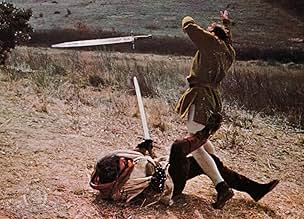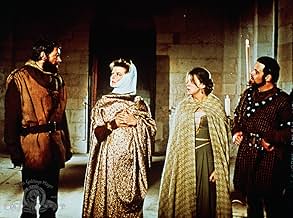1183 d.C.: los tres hijos del rey Enrique II quieren heredar el trono, pero él no se compromete a elegir. Ellos y su esposa planean obligarlo.1183 d.C.: los tres hijos del rey Enrique II quieren heredar el trono, pero él no se compromete a elegir. Ellos y su esposa planean obligarlo.1183 d.C.: los tres hijos del rey Enrique II quieren heredar el trono, pero él no se compromete a elegir. Ellos y su esposa planean obligarlo.
- Ganó 3 premios Óscar
- 16 premios ganados y 18 nominaciones en total
- Strolling Player
- (as Mark Griffith)
Opiniones destacadas
The story is set in Britain, 1183. Henry II is on the throne and has ten years earlier imprisoned his wife Eleanor of Acquitaine after co-conspirating a civil war against him. She and their three sons (Richard, the eldest, a brave warrior on the battlefield, whom Eleanor wants to succeed Henry as king; Geoffrey, the quietly vicious, unappreciated middle son of whom neither of them love with a plot for every occurrence and John, the piggish, dirty, thieving brat is their youngest whom Henry for some unknown reason wants on the throne) are all requested to appear at their palace of Chinon for the Christmas holidays. Also invited is young King Philip II of France whose elder sister Alais is the treasured and much-loved mistress to Henry. Philip wishes to have Alais mearried off to one of Henry's sons (preferably Richard) in order to form an alliance between England and France made between Henry and Philip's father, the late King Louis. But meanwhile, Philip is also plotting with all three boys and Eleanor to tear Henry's kingdom apart. Eleanor is merely in on it to get back at Henry for loving Alais (whom she had raised as a surrogate daughter) and the late Rosmund, an old rival of Eleanor's whom Henry replaced her with.
This film has it all: infidelity, betrayal, family dysfunction and a script that crackles with venom, wit and plot-twisting motivation. See it if only for O'Toole and Hepburn's first-rate performances.
I found this movie quite by accident--I was a sixteen-year-old with a Katharine Hepburn fixation. She mesmerized me; I wanted to BE her--smart, beautiful, sexy, and unwilling and unable to take anything off of anybody (except for Spencer Tracy, but that's another story). Honestly, I had no idea that there really had been such a person as Eleanor until I saw this movie. After watching my heroine portray her, I was determined to find out, though...so I have Katharine Hepburn to thank for my discovery of a new personal hero, and for my passion for medieval history.
It is true that this movie is not 100% factually accurate, not only because movie making dictates tinkering with history to create an interesting film, but also because, unfortunately, not too much is known about Eleanor herself. In the middle ages, women, even powerful, intriguing women like Eleanor, were not considered "important" enough to merit full biographical treatment. Most of Eleanor's history is recorded in the context of her sons and husbands. A good deal of this history was written by her detractors--people who disliked or disapproved of her for one reason or another. The simple explanation is that they felt that as a woman, she overstepped the bounds of what was considered "acceptable behavior" for a woman of the period.
That being said, this movie is 100% spiritually accurate. It perfectly captures the intrigue, the complexity of emotions and relationships, and tone of the age and the situation at hand. Though the sharp and witty dialogue is often considered a historical anachronism, this is not strictly true. Contrary to popular belief, people WERE educated in the middle ages, even women, if they were fortunate enough to be brought up in noble households, as Eleanor was. She was a brilliant woman, raised in a household where poetry and intelligent conversation were staples (her grandfather, after all, was one of the first troubadours). Henry was an intellectual powerhouse as well--he was a voracious reader who was often caught reading in church instead of paying attention to the sermons! It is unthinkable that these two minds would have produced stupid children, and the notion that the entire family should have only spoken in grunts and simple phrases is equally ludicrous.
Though not historically accurate, as other reviewers have noted, the strength of this movie lies in it's perfect portrayal of some of the most fascinating and complex personalities in recorded history. Henry, Eleanor, Richard, et al., make today's political and royal figures seem like low-rent bumbling hucksters.
Sparks really do fly in this wickedly elaborate chess game as the family player pieces weave thick webs of deceit and hatch insidious plots against each another, forming unholy, protean alliances that put those "Survivor" contestants to shame. The pure joy comes from seeing all of them try to outmaneuver each other with every new and different playing piece put on or taken off the board, hatching alternative schemes as fast as one can say "Long live the King!"
Robust, boisterous Peter O'Toole is a raging marvel as the battered but not yet beaten monarch, agonizing over the untrusting, Machiavellian-like brood he's sired, yet relishing the absolute power he holds and dangles over them. The glorious O'Toole is alternately barbarous and bombastic in one of the best roles of his career, and his loss of the Academy Award over, of all people, John Wayne, remains a travesty of justice.
The king's "brood" includes eldest son and heir-apparent, Richard (known as The Lion-hearted) whose fierce courage and burly warrior stance masquerades a forbidden tenderness detrimental to his standing as a king. Anthony Hopkins, in an auspicious screen debut, embodies these tortuous complexities within Richard perfectly, especially in his scenes as "mummy's favorite." The youngest and pruniest of the three princes is John, a rumpled, drooling, inane man-child impossibly spoiled as the King's favorite, played to pathetic amusement by a terrific Nigel Terry. Neglected middle son, Geoffrey, excellently portrayed with jaded, sliver-eyed cunning by John Castle, is a human blueprint of treachery and deceit. Resentful at being overlooked as even a possible contender, he's willing to sell his parents and brothers down the river for exact change.
Also invited to Christmas court is King Phillip II of France, on a revenge mission himself, who locks horns with Henry over lost lands and becomes a willing participant in these under-handed games. Timothy ("007") Dalton drips with smug, venal charm as the slender, softer, inexperienced king who can only battle Henry with words and wit, not weight. The only unblemished pawn here is Alais, the King's adoring young mistress, who is maliciously thrown to the lions by all as lady-in-waiting bait for the dueling princes. Demure, fragile Jane Merrow is the perfect choice for this innocent songbird with nothing and everything to lose
I have saved the best performance for last. As the King most duplicitous irritant, the inimitable Katharine Hepburn portrays Henry's duly banished Queen Eleanor of Aquitaine with all the unparalleled skill and inspired passion imaginable. Handed on a silver platter the lion's share of the best lines, Hepburn more than delivers the goods here, stealing the ripe proceedings from her talented co-stars. To watch her consummate Eleanor is to see the art of acting in its most passionate form. She is a revelation of perks and prods, of vibrant colors and shadings. She inhabits the passion, the power, the breeding, the deceitfulness, the desperate longing owed this character. Imprisonment (for inciting rebellions against her husband), has not dampened the fighting spirit nor dulled the sharp, calculating mind of this Queen. As in chess, this player is the game's most venturesome and versatile piece, and Hepburn more than lives up to its reputation, a worthy opponent with the best odds to check-mate her King. I have been known to say that the four-time Oscar winner was awarded for all the wrong movies -- excepting this one. She is unforgettable.
Topped with a glorious, inspiring, sometimes furious score (Oscar-winner John Barry), "The Lion in Winter" makes up for its stark, one-note surroundings with its bold, rich characters and ingenuous plotting. It is a hallmark of Gothic temperament and tone. As the old adage goes, "it's not who wins, it's how you play the game." 'Tis so true. So let the games begin!
This film is a rich pageant of fun for drama enthusiastic and history lovers . This is a magnificent film inspired on real events and writings by James Goldman adapted from his own play , which deservedly won an Oscar . Superb drama with top-notch performances , duo starring gives triumphant characterizations . Fantastic and evocative musical score fitting to medieval times by John Barry with Academy Award included . Sensational production design shot on location and with an impressive castle ; furthermore , an atmospheric cinematography by Geoffrey Unsworth , reflecting splendidly Middle Age . The tale was marvellously directed by Anthony Harvey at his best film , but after this , he strayed into the critical , though not commercial hits . Remade recently for television in inferior version by Andrei Konchalovsky with Patrick Stewart (Henry II) and Glenn Close (Eleanor of Aquitaine).
¿Sabías que…?
- TriviaKatharine Hepburn bested Peter O'Toole as the top dog on the set. Known to be something of a tyrant on most of his shoots, O'Toole meekly obliged, when she told him, "Peter, stop towering over me. Come and sit down and try to look respectable." O'Toole readily admitted in her presence that she reduced him "to a shadow of my former gay-dog self. She is terrifying. It is sheer masochism working with her. She has been sent by some dark fate to nag and torment me." Her reply: "Don't be so silly. We are going to get on very well. You are Irish, and you make me laugh. In any case, I am on to you, and you to me."
- ErroresChristmas trees were a somewhat obscure German tradition, introduced to the British royal family, and, by extension, England, by Queen Charlotte. It was not commonly decorated in English homes until the introduction of this custom by Prince Albert. Even the concept of using glass balls was unknown to Germans until long after the 12th century.
- Citas
John: A knife! He's got a knife!
Eleanor of Aquitaine: Of course he has a knife, he always has a knife, we all have knives! It's 1183 and we're barbarians! How clear we make it. Oh, my piglets, we are the origins of war: not history's forces, nor the times, nor justice, nor the lack of it, nor causes, nor religions, nor ideas, nor kinds of government, nor any other thing. We are the killers. We breed wars. We carry it like syphilis inside. Dead bodies rot in field and stream because the living ones are rotten. For the love of God, can't we love one another just a little - that's how peace begins. We have so much to love each other for. We have such possibilities, my children. We could change the world.
- Versiones alternativasA 70mm version was released in Australia in 1969, and in the UK in 1973.
- ConexionesFeatured in Precious Images (1986)
Selecciones populares
Detalles
- Fecha de lanzamiento
- País de origen
- Sitio oficial
- Idiomas
- También se conoce como
- The Lion in Winter
- Locaciones de filmación
- Productora
- Ver más créditos de la compañía en IMDbPro
Taquilla
- Presupuesto
- USD 4,000,000 (estimado)
- Total en EE. UU. y Canadá
- USD 18,177
- Fin de semana de estreno en EE. UU. y Canadá
- USD 5,339
- 18 dic 2016
- Total a nivel mundial
- USD 20,139
- Tiempo de ejecución
- 2h 14min(134 min)
- Color
- Relación de aspecto
- 2.35 : 1

































